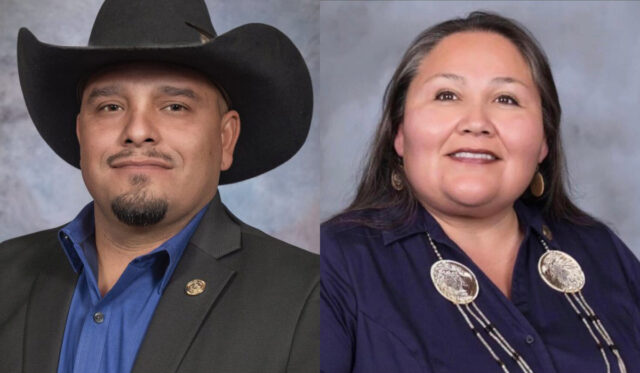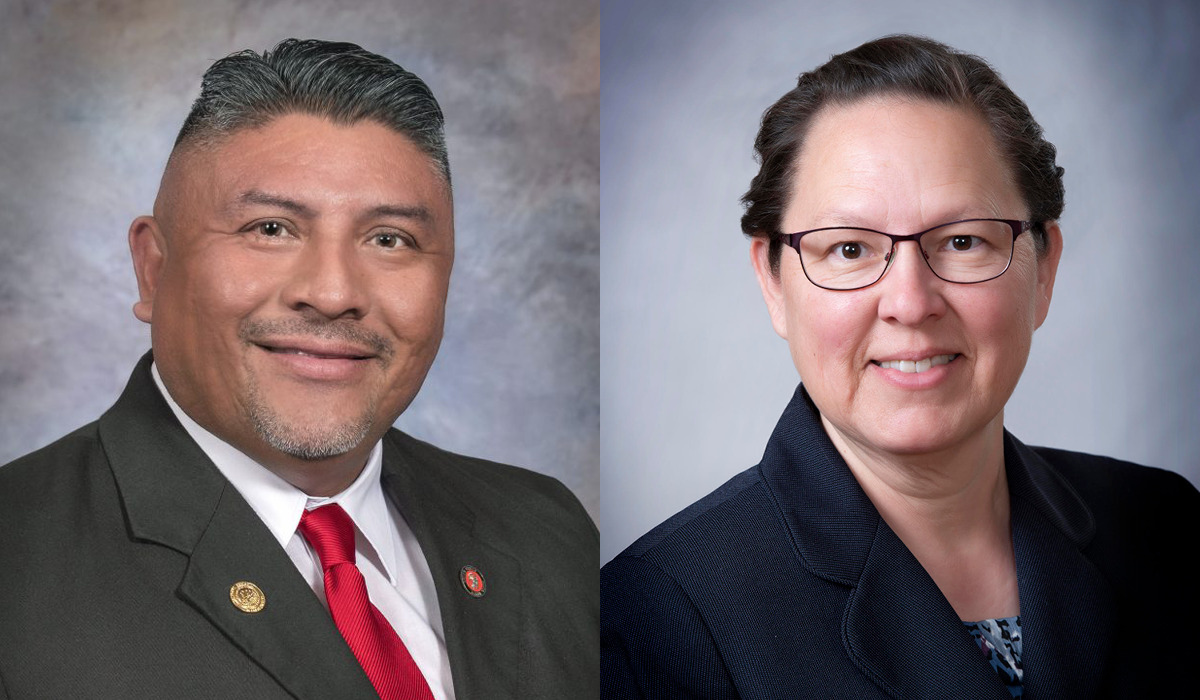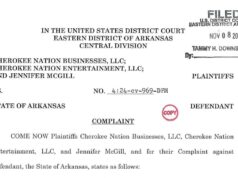

(Update: After the publication of this article, incumbent Rep. Joseph Hicks reached out to NonDoc seeking an interview. With a court hearing also scheduled to consider “accelerating” one of his misdemeanor plea agreements, a subsequent article was published Thursday, Nov. 2. The article below remains in its original form.)
Incumbent Rep. Joseph Hicks and challenger Dode Barnett are racing toward a Nov. 4 general election for the Creek District’s Seat A on the Muscogee Nation Tribal Council.
During the Sept. 16 primary election, Barnett and Hicks clashed in a close campaign where Barnett received 39.54 percent of the vote, while Hicks earned 38.98 percent. Leney McNac came in third place with 21.48 percent of the electorate. Since no one received a majority of the vote, Barnett and Hicks advanced to the tribe’s 2023 general election ballot.
However, the two candidates first clashed in a 2019 Creek District Seat A election that saw Barnett fail to advance past the primary election. Hicks went on to win his first four-year term in office after defeating Dean Hughes in the general election. Barnett had served five years in the Creek District’s Seat B from 2012 to 2017, but she chose not to seek reelection in 2017.
“When I initially ran in 2012, I had a desire to serve the Creek people, and I didn’t even really have a firm idea of what that would look like,” Barnett said. “This time, going back into it, I know the environment. I know a lot of the players on the tribal side, because a lot of them are still there from the last time I was on council. So I have a very firm, rock-solid idea of what it’s going to be like when I get there.”
The Creek District includes Sapulpa and Bristow, but all registered voters in the Muscogee Nation are allowed to vote in each Tribal Council race. Beyond the Hicks and Barnett matchup, the only other race on this year’s general election ballot is between incumbent Tribal Council Speaker William Lowe and challenger Robyn Whitecloud.
Absentee ballots for the Nov. 4 general election have already been mailed out, and early voting is set from 7 a.m. to 7 p.m. on Nov. 1 and Nov. 2. The registration deadline for in-person voting is 5 p.m. Tuesday, Oct. 24.
Hicks did not respond to a phone call, an email or a Facebook message seeking an interview this story previewing the election. He also has not conducted a candidate interview with Mvskoke Media, the tribe’s independent and constitutionally protected news publication.
Barnett, however, agreed to an interview with NonDoc discussing her candidacy, and she recorded an interview with Mvskoke Media on Aug. 17.
Hicks pleaded no contest to two DUI charges
Over the last year and a half, Hicks has found himself in hot water legally and politically. According to reporting from Mvskoke Media, Hicks pleaded no contest to a misdemeanor DUI in September 2022, then another misdemeanor DUI in July 2023. He was on probation for the first offense at the time he pleaded no contest to the second.
According to MCN code, any person convicted of a second DUI offense “shall be deemed guilty of a felony,” but Hicks was only charged with a misdemeanor for the second offense.
Hicks apologized to the Tribal Council on Aug. 26, citing his own “personal struggles and demons.”
“I’d like to express my deepest apologies to my family, who it affected the most, also to any others that were effected by my actions,” Hicks said. “I understand that this behavior did not only affect my image (…) along with how persons outside of our tribe look at our citizens, and for that I am truly sorry.”
Barnett said she is unsure how Hicks’ second DUI could be charged as a misdemeanor, rather than felony.
“I don’t know. It’s up to the [Attorney General] how a defendant gets charged,” Barnett said. “I would probably defer that to Attorney General Wisner to see why he wasn’t charged with a felony.”
However, when asked why Muscogee citizens should cast their votes for her instead of Hicks, Barnett gave a blunt answer.
“The last three years I was on council, I sponsored over 250 legislations. In the three years and nine months that Joe Hicks has been on council, he’s sponsored 82,” Barnett said. “I did triple the work he’s done. I was always available. I always answered my phone. I did it to the best of my ability, and I did nothing that embarrassed our people.”
‘Creating enforceable policies and procedures’
Among other priorities, Barnett said her motivation to seek office again was to bring additional ethical standards to the Muscogee Nation Tribal Council.
“That’s been part of my platform,” Barnett said. “If the people choose to reelect me, then I definitely want to dig into fortifying our ethics and Code of Conduct laws, as well as creating enforceable policies and procedures for the council to follow.”
Prior to leaving the Tribal Council in 2017, Barnett accused Lucian Tiger, a fellow council representative, of slapping her on the butt outside the Tribal Council’s offices in 2015. Barnett said she spoke out about the incident in hopes it would “spark change.”
“I was hoping to affect positive change in the nation,” Barnett said. “Not one policy was changed, not one law was changed, absolutely zero changed at the nation. I was super frustrated and very disheartened about that.”
Barnett said she felt ostracized by fellow council representatives after she came forward with the allegations.
“I acknowledge that some people that are currently on the National Council would not be excited to see me return, but not just because of that. I was outspoken about a lot of things,” Barnett said. “I was outspoken about being bullied and intimidated by other female representatives. I was outspoken about what Mr. Tiger did. I was outspoken about domestic violence survivors and advocating for them. I was outspoken about protecting children. So anything that I feel strongly about, I’m always outspoken about.”
Barnett also said enacting new policies and procedures requires compliance from council reps, adding that some of the representatives on the National Council do not want compliance.
“When you have a situation where the majority of the body may not want compliance, then you’re not going to have it,” Barnett said. “There’s really nothing anybody can do about it, except for elect new people the next election that comes around. So, I think we’re kind of in one of those cycles where we’re trying to weed out some of the people that don’t want transparency, that do not want accountability.”
Barnett not in favor of full Freedmen citizenship
Barnett said she wants the lingering question surrounding Muscogee Freedmen citizenship decided by a vote of the people. Still, she said she has questions around granting full citizenship to the descendants of former Muscogee slaves.
“I don’t think that I would be in favor of full citizenship,” Barnett said. “I have questions around the timing and their citizenship in general. I understand that they signed the treaty, but at the time, they were U.S. citizens, and we were not. So how does that affect their ability to sign? Did they formally relinquish their U.S. citizenship?”
In a Sept. 27 decision, Muscogee Nation District Court Judge Danette Mouser ruled that the Muscogee Nation Citizenship Board erred when denying a pair of applications from Freedmen seeking citizenship within the tribe. Mouser said the board’s decision conflicted with the Treaty of 1866.
RELATED
Robyn Whitecloud tries to oust Speaker William Lowe from Muscogee Nation Council by Michael McNutt
“The court finds that the actions of the board in denying plaintiffs’ citizenship applications and appeals were contrary to law, specifically the Treaty of 1866 and its required inclusion of the Creek Freedmen and their lineal descendants within the citizenship of the Muscogee (Creek) Nation,” Mouser wrote in her order.
The Muscogee Nation appealed Mouser’s ruling to the Muscogee Nation Supreme Court and filed a motion to stay enforcement of order, which was ultimately granted Oct. 2.
“The order and opinion of the District Court represents a significant change in citizenship procedures for the nation. Requiring the appellant to immediately comply with the District Court’s ruling while an appeal is pending, and before this court has issued its final ruling on the matter, could cause undue harm to the appellant and to the respondents, as well as to any other individuals who may choose to apply for citizenship on the basis of the lower court’s ruling,” the order reads. “As such, this court grants the appellant’s motion to stay enforcement pending final adjudication on the matter.”
Barnett said the Treaty of 1866 must be enforced if the Nation wants the U.S. Supreme Court’s landmark decision in McGirt v. Oklahoma upheld.
“The District Court cannot mandate that (the Citizenship Board) enroll people who are not Creek by blood. Our current constitution says it’s Creek by blood that enrollment is based on, and that can only be changed by the will of the people,” Barnett said. “So I think that this ultimately may have to be decided by our general population, not just tribal leadership.”





















